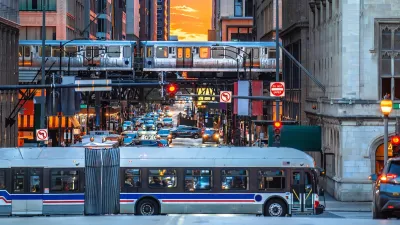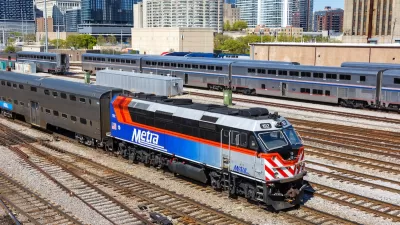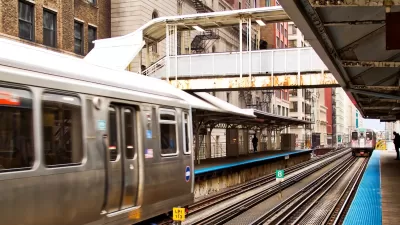Chicago's Metra commuter rail service has a big problem on its hands: Distressed people are resorting to using train tracks to end their lives at a higher rate than in other major cities. Would partnering with a suicide-hotline agency stem the tide?
"Signs on railway station platforms in Boston, New York and Toronto are intended to offer help to anyone who is emotionally distressed or suicidal _ a last-ditch effort to keep people from taking a final, fatal step onto the train tracks," writes Richard Wronski of the Chicago Tribune (and published in Governing.)
"As new research shows that a higher percentage of train fatalities in the Chicago area are suicides than in the rest of the U.S., some experts say it's time for Metra to consider adopting such a policy.
In addition to the person who ended his/her life, "officials say there are wide-reaching public consequences: Fatalities exact a heavy toll on train crews as well as on witnesses and emergency responders. The resulting investigations cause delays that can disrupt hundreds of commuters' lives," adds Wronski.
"Until now, reports on the effectiveness of suicide prevention efforts have been largely anecdotal, experts say," writes Wronski. "But results are due soon from a 36-month project called RESTRAIL, for Reduction of Suicides and Trespasses on Railway Property, that was conducted on Europe's rail lines."
Chicago's high rate of suicides may be attributed to several factors, according to "Northwestern University professor Ian Savage, who has done extensive research on the subject."
- "Nationally, about 30 percent of railroad-pedestrian fatalities are apparent suicides, versus 47 percent in the Chicago area, Savage said.
- "Savage attributes the higher incidence of railroad suicides in the Chicago area to the greater prevalence" of commuter, freight and inter-city trains. It's "the nation's second-busiest commuter rail network."
Surprisingly, the hotspots for suicide were not in the city but in the "the far suburbs in DuPage and Lake counties."
Wronski writes about suicide-prevention programs run by rail agencies on Long Island; in Boston, Japan, Toronto and Washington, D.C.
FULL STORY: Chicago Is Working to Prevent Train Suicides

Alabama: Trump Terminates Settlements for Black Communities Harmed By Raw Sewage
Trump deemed the landmark civil rights agreement “illegal DEI and environmental justice policy.”

Planetizen Federal Action Tracker
A weekly monitor of how Trump’s orders and actions are impacting planners and planning in America.

Why Should We Subsidize Public Transportation?
Many public transit agencies face financial stress due to rising costs, declining fare revenue, and declining subsidies. Transit advocates must provide a strong business case for increasing public transit funding.

Understanding Road Diets
An explainer from Momentum highlights the advantages of reducing vehicle lanes in favor of more bike, transit, and pedestrian infrastructure.

New California Law Regulates Warehouse Pollution
A new law tightens building and emissions regulations for large distribution warehouses to mitigate air pollution and traffic in surrounding communities.

Phoenix Announces Opening Date for Light Rail Extension
The South Central extension will connect South Phoenix to downtown and other major hubs starting on June 7.
Urban Design for Planners 1: Software Tools
This six-course series explores essential urban design concepts using open source software and equips planners with the tools they need to participate fully in the urban design process.
Planning for Universal Design
Learn the tools for implementing Universal Design in planning regulations.
Caltrans
Smith Gee Studio
Institute for Housing and Urban Development Studies (IHS)
City of Grandview
Harvard GSD Executive Education
Toledo-Lucas County Plan Commissions
Salt Lake City
NYU Wagner Graduate School of Public Service





























